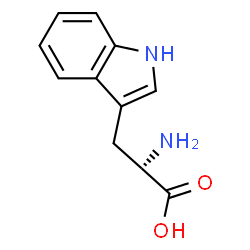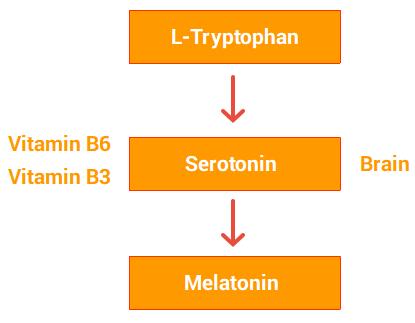How L-Tryptophan helps you sleep better
Natural L-tryptophan is an amino acid that promotes sleep and reduces stress. It is used by our body to manufacture serotonin, which promotes deep sleep. Serotonin also helps to manage stress and reduce mood disorders. Then melatonin, the sleep hormone, essential for the proper functioning of the internal biological clock.

L-Tryptophan Structure
L-tryptophan is one of the eight essential amino acids our body needs. L-tryptophan is therefore not manufactured by our body and must be provided by our diet. Natural L-tryptophan allows better assimilation by the body. It requires essentially the presence of vitamins B3 and B6 and carbohydrates for its transformation.
Metabolism to Melatonin, the Sleep Hormone
Metabolism of natural L-tryptophan leads to the production of endogenous serotonin and melatonin. The presence of carbohydrates, such as oats, in the presence of L-tryptophan results in a high concentration of L-tryptophan and its passage through the blood-brain barrier of the brain. This is where L-tryptophan is transformed into serotonin, then into melatonin, the mediators of sleep. This transformation requires the mandatory presence of vitamin B6 in sufficient quantity.
In the human body, according to its traditional metabolism, natural L-tryptophan is also used, and at 95%, for the synthesis of vitamin B3. This is why a nutritional intake of vitamin B3 is essential to occasionally reverse this ratio to allow the development of the Serotonin – Melatonin synthesis pathway.
Serotonin organises the structure of our sleep and its continuity. It induces sleep and entry into the phases of deep sleep and REM sleep essential for proper physical and nervous recovery. Serotonin is then transformed into melatonin, the sleep hormone, which ensures the proper functioning of the circadian rhythm or biological rhythm.

Recommended daily intake
According to the U.S. Institute of Medicine, the Recommended Dietary Allowance (RDA) of 5 mg/kg body weight/day of L-Tryptophan for adults 19 years and over.
Top Foods high in Tryptophan (Trp)
The table below shows the content in g of Tryptophan/100 g of food.
| Food | Tryptophan [g/100 g of food] |
Protein [g/100 g of food] |
Tryptophan/protein [%] |
|---|---|---|---|
| Egg white, dried | |||
| Spirulina, dried | |||
| Cod, Atlantic, dried | |||
| Soybeans, raw | |||
| Cheese, Parmesan | |||
| Sesame seed | |||
| Cheese, Cheddar | |||
| Sunflower seed | |||
| Pork, chop | |||
| Turkey | |||
| Chicken | |||
| Beef | |||
| Oats | |||
| Salmon | |||
| Lamb, chop | |||
| Perch, Atlantic | |||
| Chickpeas, raw | |||
| Egg | |||
| Quinoa, uncooked | |||
| Wheat flour, white | |||
| Baking chocolate, unsweetened | |||
| Milk | |||
| Quinoa, cooked | |||
| Rice, white, medium-grain, cooked | |||
| Potatoes, russet | |||
| Tamarind | |||
| Banana |
Sleep efficiency of the combination of natural L-tryptophan – vitamin B6 – vitamin B3
The “L-tryptophane-vitamin B6-vitamin B3” complex taken in addition to a high carbohydrate intake has shown a significant 39% increase in deep sleep time in people with difficulty of sleeping, however, these results were not found with synthetic L-Tryptophan.
INCREASED SLEEP TIME IN THE MIDDLE OF THE NIGHT: 39,3% WITH NATURAL COMPLEX, 3,2% WITH PLACEBO.
A second study showed that taking milk proteins rich in natural L-tryptophan not only improves the quality of sleep but also improves the attention and intellectual performance of the next day.
L-Tryptophan also fights stress, overwork and mood swings
A lot of research provides evidence linking serotonin to stress and depression. This is particularly observed during dietary deficiencies in natural L-tryptophan, the precursor of serotonin synthesis.
Firk, in his double blind versus placebo clinical study, demonstrated that stress can induce a depressive episode, both in people with and without a family history of depression, and that this episode is exacerbated if there is food deprivation with L-tryptophan. This suggests the mediation of serotonin in stressful situations and particularly in people with a family history of depression.
Also, a dietary deficiency of L-tryptophan seems to provide less resistance to uncontrollable stress caused by noise in healthy volunteers than in the placebo.
Conversely, the intake of L-tryptophan would provide better resistance to stress. It is known that cognitive performance often decreases under chronic stress exposure. A clinical study, carried out in double blind versus placebo, shows that a diet rich in L-tryptophan significantly increases cognitive performance (better reaction time) in people sensitive to stress.
This study was confirmed by a second crossover clinical study, double-blind, versus placebo, which observed that a diet rich in L-tryptophan was beneficial in combating mood and stress disorders.
Natural L-Tryptophan VS Synthetic L-Tryptophan
Studies have shown a very good bioavailability of 100% natural L-tryptophan provided from milk proteins. Many foods are excellent sources of L-tryptophan, such as meat, poultry, and fish. But they also contain many other amino acids that compete with L-tryptophan and, therefore, limit its passage through the brain.
On the other hand, synthetic L-tryptophan has very poor bioavailability, making it ineffective and sometimes unsafe.
Milk proteins contain a high concentration of L-tryptophan compared to other amino acids, which allows a better blood concentration of L-tryptophan.
L-tryptophan, a very fragile essential amino acid
It is the least abundant amino acid in food and is very fragile. In particular, it is easily destroyed by cooking that is too long or too hot.
It undergoes a strong competition sometimes causing a lack for our body. Indeed, protein nutritional intakes also contain many other amino acids that compete with L-tryptophan and, therefore, limit its passage through the brain: a meal that is too rich in protein harms sleep because it can cause a higher blood concentration of tyrosine, an amino acid used to produce dopamine, a neurotransmitter associated with motor activity and aggression.
Finally, as we have seen previously, L-tryptophan is used primarily by our body to preferentially produce vitamin B3 to serotonin and melatonin. It is therefore essential to reverse this ratio to optimise the serotonin – melatonin synthesis pathway.
Foods Rich in L-Tryptophan
The nutritional composition table of food doesn’t detail the precise tryptophan levels. However, the following foods are the richest in tryptophan.
- Whole grain rice
- Meat and poultry
- Dairy products
- Eggs
- Soya protein
- Peanuts
- Fish
- Pulses
- Chocolate
- Banana
- Almonds
- Cashew nuts
- Brewer’s yeast
Use of tryptophan
The nutritional recommendations are to consume 500 to 2000 mg of tryptophan per day for a healthy adult.